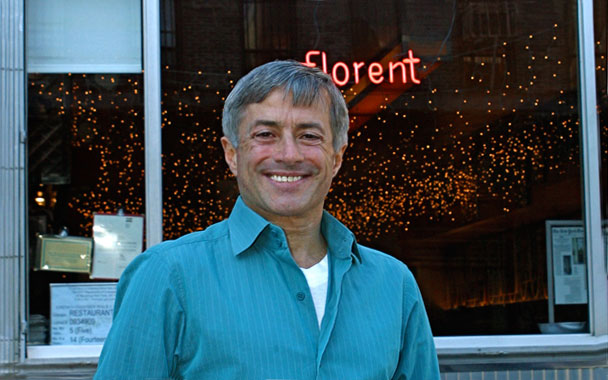You have to sell a lot of omelets to pay the rent in Manhattan’s Meatpacking District these days. And when Florent Morellet’s landlord jacked up the rent on his restaurant, Florent, by enough to keep up with its chichi new neighbors, Morellet decided to pull the plug on 23 years at 69 Gansevoort Street. (The closing date is June 29, the last day of New York’s Gay Pride weekend.)
For anyone who ever sat at Florent’s counter at four in the afternoon or slouched into a banquette at four in the morning, the news felt a little like a death in the family. So Morellet is offering a little comfort for grieving customers: Beginning two Mondays ago, and continuing until Florent’s final day, it is holding a series of themed events and performances, with each theme representing one of the Kübler-Ross stages of grief. (This week we’re in the bargaining stage.)
In 2003, I interviewed Morellet, who had turned 50 not long before, and we talked about life in the restaurant business, and just life—the things that make his notoriously devilish heart skip a beat. Here, some excerpts from that talk, over plates of boudin noir and a bottomless cup of coffee.—Nanette Maxim
Nanette Maxim: So what’s different now that you’re 50?
Florent Morellet: The worst part was when I was 49. I had a big crisis in my life. But it was over by the time I turned 50. Then I had a big party in the south of France, at my brother’s restaurant, and my friends came from all over the world.
NM: Was cooking an important part of family life for you, growing up?
FM: Obviously in France, eating and cooking are a big part of living. My family was very into being hosts, because we had a business: We were the largest manufacturer of baby carriages in France. We also made toy metal racing cars. [In the restaurant is a picture of Florent, at around age 6, wearing little leather driving gloves and holding one of the cars.] My great-grandfather started a business making harnesses for horses before World War I. And after the war he started making the baby carriages, as the horse business was over. We sold the business in 1975 and my father has been fully involved with his art ever since. Mom is not an artist but she’s a manager.
NM: When did you first come to New York?
FM: I moved to New York in ’78. But before that, of course, I had a restaurant in Paris, on the Left Bank, near Montparnasse. In some ways it was like Florent—it was funky, and it was considered the first cool, hip restaurant in Paris. [Laughs.] It was a great social success but a financial disaster.
I was cooking there, with an American partner, and we did everything. So I was waiting on tables. Parisians are just a pain in the butt to serve. They’re very difficult. It’s the restaurant culture; there’s a different relationship between waiters and customers than there is in America. In America there is no class differential. You know, here I am Florent, a restaurant owner, and the staff and the customers are on the same level. The customers treat my waiters as equals. But in Paris people treat waiters very much like a separate class. For example, I have an uncle who felt that my restaurant was an insult to him and to the family—what were people going to think that his nephew was in the restaurant business?
NM: How did you deal with that?
FM: Well, I didn’t, but my mother had to, and it was very painful for her. My father is an artist, an iconoclast. My parents were fine with [my career choice]. But for me, dealing with customers who treated me like shit, it was hard, very painful. A typical story: A table treated me so obnoxiously. At the end of the meal—and I mean, they were really, really obnoxious—I told them who I was. One of the women had a gallery that had shown my father’s work. Suddenly they were ashamed at what they’d done to me; they were excusing themselves…. But I felt I’d won, I’d kept my calm throughout the whole thing. It’s a game in Paris, but not a pleasant game.



 Pinterest
Pinterest


